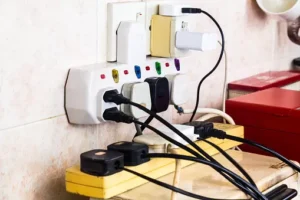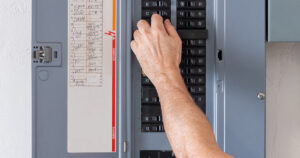In today’s fast-paced digital age, our dependence on electrical devices is greater than ever before. From smartphones and laptops to kitchen appliances and entertainment systems, we rely on electricity to power our daily lives. However, there’s a hidden danger lurking within our homes and workplaces: overloaded circuits. Ignoring the warning signs of overloaded circuits can lead to serious consequences, including electrical fires, property damage, and even life-threatening situations. In this blog, Anchor Electric will explore the dangers of overloaded circuits and how to prevent them to ensure the safety of your home and loved ones.
Understanding Overloaded Circuits
 To understand the dangers of an overloaded circuit, it’s essential to know what one is. An overloaded circuit occurs when you connect too many electrical devices or appliances to a single circuit, drawing more current than the wiring can handle safely. This excess current generates heat, which can cause wires to overheat, insulation to melt, and potentially ignite a fire. Overloaded circuits are a common issue in both residential and commercial settings, and they pose significant risks if left unaddressed.
To understand the dangers of an overloaded circuit, it’s essential to know what one is. An overloaded circuit occurs when you connect too many electrical devices or appliances to a single circuit, drawing more current than the wiring can handle safely. This excess current generates heat, which can cause wires to overheat, insulation to melt, and potentially ignite a fire. Overloaded circuits are a common issue in both residential and commercial settings, and they pose significant risks if left unaddressed.
The Dangers
- Electrical Fires: Perhaps the most severe danger associated with overloaded circuits is the risk of electrical fires. As the wires and components overheat, they can ignite nearby materials such as insulation, wood, or dust. Electrical fires can spread rapidly, and they are often challenging to extinguish, making them a life-threatening hazard.
- Property Damage: Overloaded circuits can lead to severe damage to your property. Apart from the fire risk, overheated wires can melt, leading to costly repairs or rewiring. Electrical appliances and devices connected to an overloaded circuit can also be permanently damaged, resulting in expensive replacements.
- Electrical Shock and Injury: Overloaded circuits increase the risk of electrical shocks and injuries. When circuits overload, they may trip or cause sudden power surges, putting anyone nearby at risk of being electrocuted when attempting to reset the circuit or unplug devices.
- Loss of Electrical Supply: Overloaded circuits can trip circuit breakers or blow fuses frequently, causing disruptions in your electrical supply. This can be inconvenient and frustrating, especially if it happens regularly.
Prevention and Safety Tips
Preventing overloaded circuits is crucial for the safety of your home or workplace. Here are some tips to help you avoid this hazard:
- Know Your Electrical System: Understand your home or office’s electrical system, including the location of circuit breakers and the capacity of each circuit.
- Use Extension Cords Wisely: Avoid daisy-chaining multiple extension cords or power strips together. If you need more outlets, consider installing additional ones or consulting an electrician.
- Balance the Load: Distribute your electrical devices and appliances across different circuits to prevent overloading any single one.
- Unplug Unused Devices: When you’re not using devices or appliances, unplug them to reduce the load on the circuit.
- Upgrade Your Electrical System: If you frequently experience overloaded circuits, consider upgrading your electrical panel and wiring to accommodate your power needs safely.
- Regular Inspections: Periodically inspect your wiring for signs of wear or damage. If you notice any issues, consult a professional electrician immediately.
- Professional Assistance: For major electrical work or if you’re unsure about your wiring’s condition, seek the expertise of a licensed electrician.
Overloaded circuits are not to be taken lightly. The potential dangers they pose, including electrical fires, property damage, and injuries, should motivate us to prioritize electrical safety. By understanding the risks, practicing safe electrical usage, and seeking professional assistance from Anchor Electric when needed, we can protect our homes and workplaces from the devastating consequences of overloaded circuits. Remember, when it comes to electrical safety, it’s always better to be safe than sorry.
Follow us on Facebook or Instagram to learn more!
